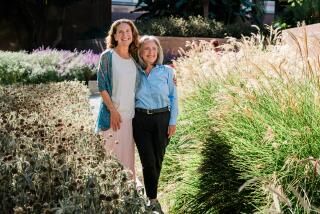Inventors Find Mothering’s a Necessity
- Share via
The room grew silent as Maria Deslierres rose to speak. “I just got tired of standing in airports,” she explained. Then she unveiled her solution: the perfect luggage cart for the post-9/11 world, one with a fold-up seat for those long waits in airport security lines.
“We’ve had the patent for three years,” Deslierres said, “but so far we haven’t been able to market it.”
With any luck, the men and women gathered in Huntington Beach on a recent Friday will be able to help. They are among 175 members of Orange County’s Inventors Forum, a group of creative thinkers with a mission.
“It’s a hard job inventing things,” explains Carl Schulthess, the organization’s chairman, who says he’s working on a project to reduce traffic on the nation’s freeways. He won’t divulge how it works, he says, because the idea isn’t patented.
“Where else can an independent inventor go?” says Schulthess, 63, an applied-optics consultant from Mission Viejo. “Inventors Forum is a networking organization that provides support and information, kind of like Alcoholics Anonymous.”
The support comes in several forms. On the second Friday of each month, the group has a meeting, open to the public, at which outside lecturers present seminars with such titles as “Funding Innovation and Inventions,” “Turning Ideas Into Fortunes,” “Protecting the Marketability of Your Invention” and “Prototyping and Manufacturing Your New Ideas.”
On the last Friday of the month, the organization holds a meeting just for members, each of whom must sign a pledge of confidentiality to attend. It is here that new ideas are presented, and feedback sought. The purpose is twofold, says Schulthess: to share ideas on technical issues and marketing, and to legally document the date of inception.
“In the United States,” he says, “the first to invent something gets the patent. Our members, in essence, are witnesses--if you document the inception, you get the green light.”
Ridiculous to Sublime
In the club’s 12 years, Schulthess says, hundreds of inventions--from ridiculous to sublime--have been launched. Several members have come up with unmarketable ideas for improving toilets. Another is working on a potentially revolutionary way to accelerate decomposition in landfills by injecting them with steam.
“By using my method,” says Reg Renaud, a 50-year-old engineer from Silverado Canyon, “we can reduce a landfill’s decomposition from 50 years to five.”
Other inventions completed or under development by forum members include a scanning system to detect irregularities--including explosives or humans--in shipping containers entering the nation’s harbors; a heavy-duty industrial security door that lets people out but not in; a car-washing tool called the Shiwala Mop, which attracted 2 million buyers on the Home Shopping Network; an electric air freshener that plugs into a car’s cigarette lighter; and a hollow “bug stick” with a “puff” of soft material on the end with which to suck up critters.
“You can pick up a bug without squashing it on the wall,” Schulthess explained.
At a recent meeting, several ideas emerged. Allen Hardison, 80, introduced his concept of using a “scent transfer unit” to enable dogs to detect the smell of certain diseases in citrus fruits and paranoid schizophrenia in humans. Lee Willis, 47, talked about his Sentinel of Security, a flashlight-size tube containing a tethered helium balloon that can be automatically inflated by campers lost in the woods to help authorities find them. And Ken Hellyer, 48, demonstrated his adjustable batting tee designed to hone baseball players’ responses to less-than-perfect pitches.
Marketing Is Tricky
The audience perked up when Gerard Russo, 76, presented his universal holder, a Velcro wrist strap that gives users a hands-free grip on almost anything.
“How are you doing with marketing this thing?” Schulthess asked.
“Lousy,” Russo replied. “I’m not a marketer. I get only words.”
“Well,” Schulthess suggested, “have you thought of marketing it to the handicapped? I think that’s a good place to start.”
Deslierres, waiting in the wings to show off her luggage-cart-with-a-seat, said she understands the value of feedback.
“We share,” said the amateur inventor, who created her first contraption--a stairway wheelchair escalator--at age 15.
“Sharing is very important in the inventor’s art. It’s kind of a disease--you start inventing and keep trying to improve things. You just can’t stop. So far, there isn’t a cure.”
More to Read
Inside the business of entertainment
The Wide Shot brings you news, analysis and insights on everything from streaming wars to production — and what it all means for the future.
You may occasionally receive promotional content from the Los Angeles Times.








